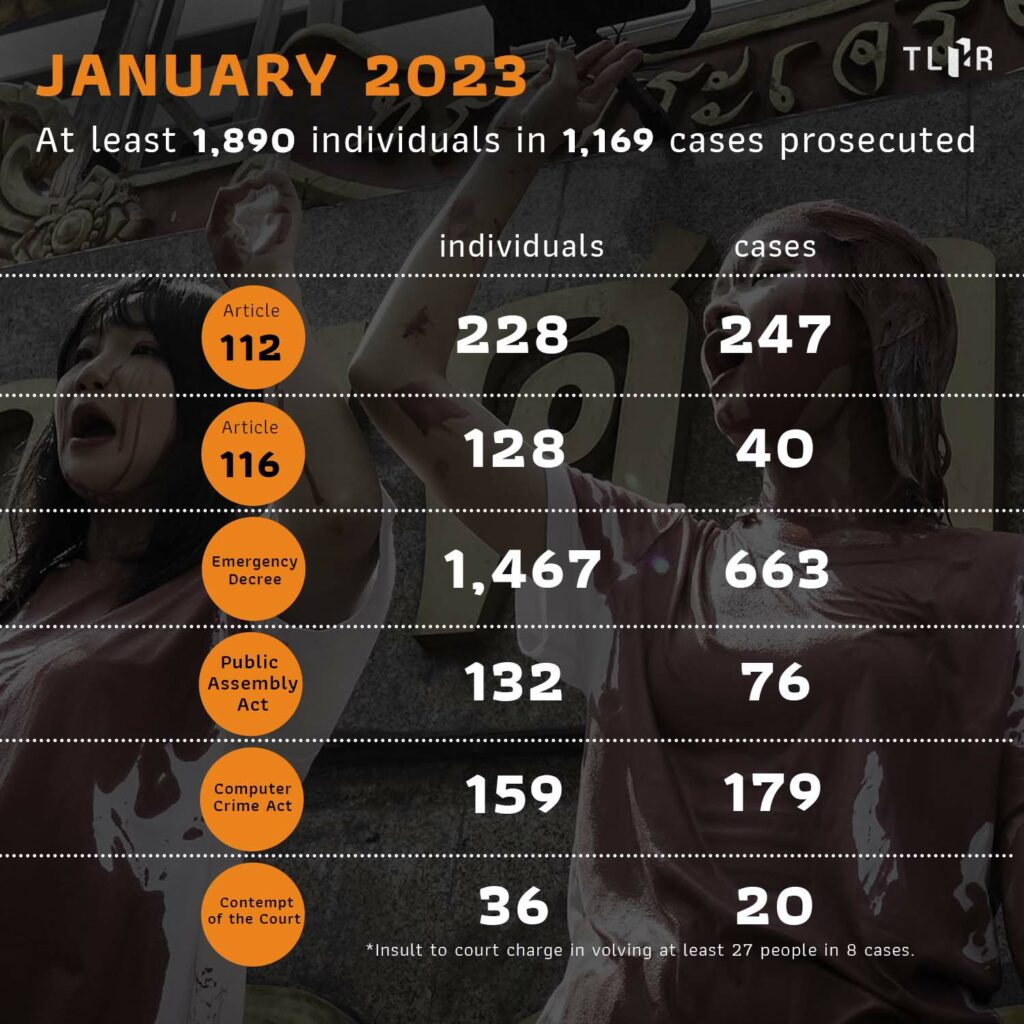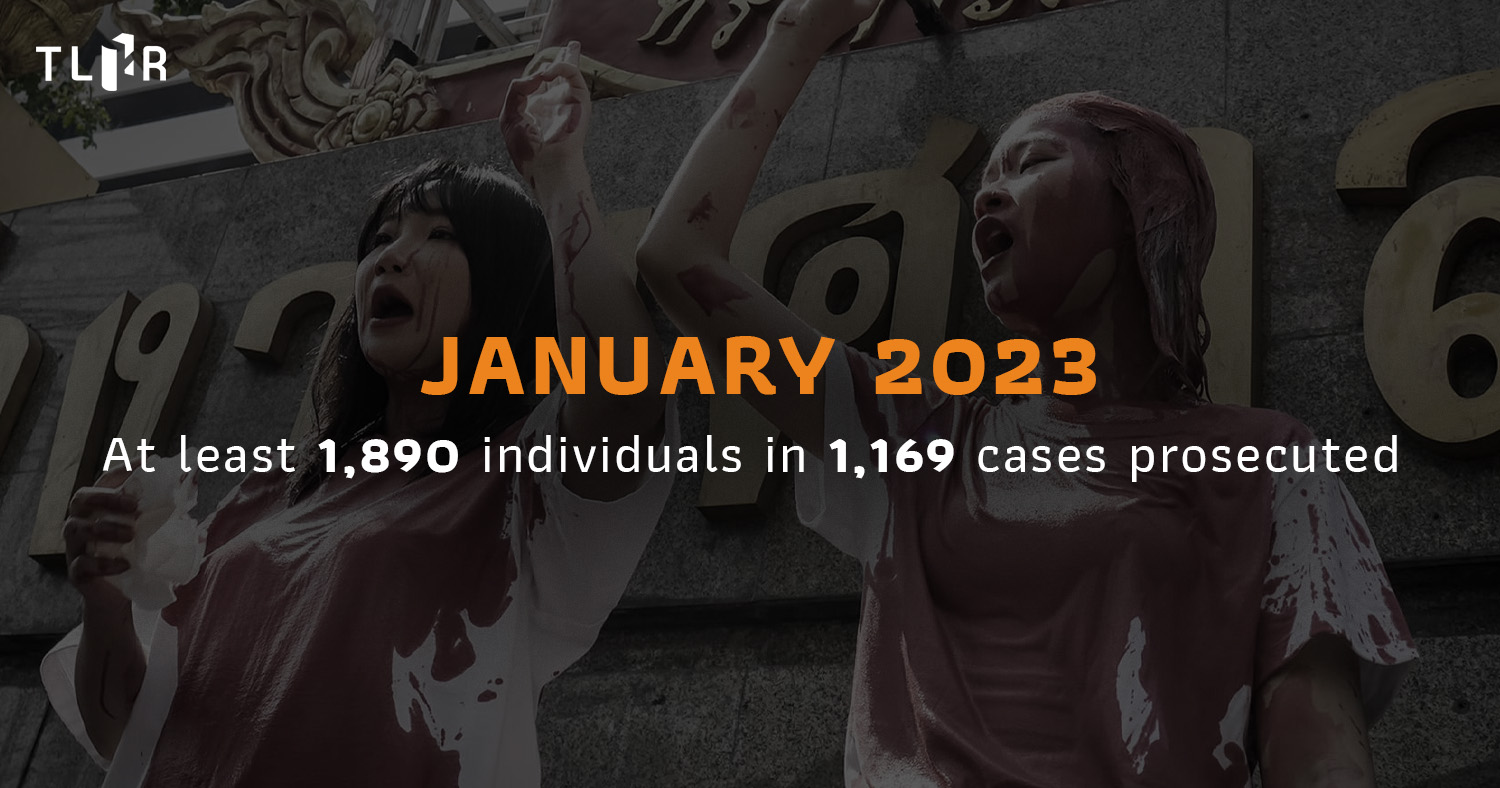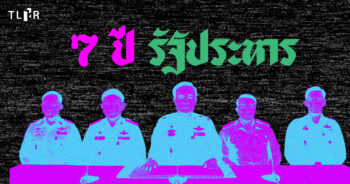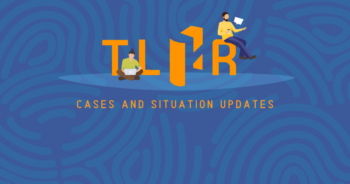One month into the 2023, the situation related to political prosecution continues to be in full swing, especially as the court revoked the bails of “Baipor – Get” accused of lèse-majestélaw. The event is followed by the self-revocation of bail by “Tawan – Bam”, which has generated a debate on the topics of the right to bail and the problems of the justice system as a whole. At the same time, the Courts of First Instance steadily issued verdicts, including in six lèse-majesté cases and eight Emergency Decree cases, while the police have further processed at least four new lèse-majesté cases last month.
According to the TLHR statistics, at least 1,890 people in 1,169 cases have been prosecuted due to political participation and expression since the beginning of the “Free Youth” protest on 18 July 2020 until 31 January 2023.
Among this number are 211 cases involving 284 youths under 18 years old, consisting of 41 people under 15 years old and 243 between 15 – 18 years old.
Compared to the end of December 2022, 2 people in 4 cases have been added to the statistics (only counting those never been charged before), including one case of youth.
If we also count and include those charged redundantly in multiple cases, we have found that there would be at least 3,772 incidents of prosecution in total.
The lawsuits can be grouped according to key charges, as follows:
1. The royal defamation or “lèse-majesté” charge under Section 112 of the Penal Code: at least 228 individuals in 247 cases.
2. The “sedition” charge under Section 116 of the Penal Code: at least 128 individuals in 40 cases.
3. Charges of violation of the Emergency Decree: at least 1,467 people in 663 cases (since May 2020 where first legal action against political protesters and activists was initiated).
(Remarks: The December statistics have been adjusted from 1,469 as the TLHR has identified an inaccuracy in its calculation. A person accused redundantly was not counted in all instances.
4. Charges under the Public Assembly Act: at least 132 people in 76 cases.
5. Charges under the Computer Crime Act: at least 159 people in 179 cases.
6. Contempt of court charge: at least 36 people in 20 cases and insult to the court charge involving at least 27 people in 8 cases.
.

Out of the mentioned 1,169 cases, 301 have been concluded, meaning 868 are still ongoing at various stages.
The prosecution trends in January 2023 observe the following key developments:
At least four new lèse-majesté cases have been initiated. Police is on the quest to press charges against the past incidents from 2020 – 2021.
The statistics of the lèse-majesté cases saw an increase of 3 people in 4 cases, as far as we know, in the past month, including Chokdee ‘Ah Lek’ Rompruek, a Ratsadon artist charged by Nang Loeng Police Station for singing and live-broadcasting the song “Chok Dee Tee Mee Khon Thai” by Fai Yen group during an anti-PM activity in August 2022. This case was the third arising from this song.
There is also a case of ‘Tee’, a Naresuan University student pressed charges by police of Mueang Pitsanulok Police Station, after he went there as a witness on a summon warrant. The case concerned an event that took place more than one year ago, but has only been picked up now.
Or the case of Attaphon ‘Kru Yai’ Buapat, filed by Nang Loeng Police Station for his speech in a protest two years earlier in November 2020. Pareena Kraikrupt was the accuser in this case.
Thus, the trend in which the police are actively pressing charges based on past political activities from 2020 – 2021 deserves to be monitored further.
Meanwhile, a 14-year-old girl has received a summon warrant from Samran Rat Police Station with yet unknown reasons, as she asked to postpone the appointment. That said, this case concerns the youngest child so far accused of the lèse-majesté law.

Last month, five more people were put behind bars during the lèse-majesté trial, including Get and Baipor, whose bails have been revoked, or Tawan and Bam, who revoked their own bail to protest the justice system. The other person was Sitthichoke, a rider sentenced to a jail term of 2 years and 4 months by the court and not granted bail during appeal.
The Court of First Instance has passed verdicts for six further lèse-majesté cases. The heaviest punishment since 2020 goes to the case of Mongkol “Busbas” Thirakhot, who was sentenced to a 28-year jail term for posting 14 texts deemed wrongful. Unlike Sitthichoke, Busbas was allowed bail during the appeal stage.
The courts acquitted three cases due to the absence of the components of crime under Section 112. These include two cases in Lampang: a case of Laila, a Thammasat University graduate accused of removing the King’s portrait during an on-campus protest in 2020, and a case of five citizens accused of hanging a sign with the text “Royal Budget > Covid-19 Vaccines”.
The other case is that of “Nakorn”, who was acquitted by Samut Prakan Provincial Court, seeing that the plaintiff’s evidences and witnesses did not carry weight failing to prove that the defendant had committed the crime as alleged.
At the end of the day, the trials and the courts’ verdicts in lèse-majesté lawsuits that have and are expected to come out in the course of this year, as well as the right to bail, or the absence thereof, during appeal, still merit a close follow-up.

.
Courts acquitted six consecutive Emergency Decree cases, while Siam Paragon accused activists of trespass.
Last month, another case related to political assemblies was filed. Some activists and citizens organized an activity inside Siam Paragon shopping mall condemning authorities’ use of violence in the dispersal of the APEC2022 demonstrations in November 2022. In response, the mall has authorized a person to file charges of trespassing by an act of violence and mischief against the trespassers with Pathumwan Police Station. It was reported that up to nine people have been accused, six of whom have already been informed of the charges.
A multitude of cases arising from protests containing charges under the Emergency Decree are still ongoing in various courts. Many activists and people have been and will be enduring burdens from legal defenses in the past years and all through this year. In the majority of cases, the courts tend to issue the orders of acquittal. Indeed, six more cases have been acquitted in January 2023.
A notable case is that of Chonthicha ‘Lookkate’ Jangrew, who was accused of being the person who notified the assembly, a big rally at the Democracy Monument on 16 August 2020, to officials. The Dusit Kwaeng Court has acquitted her of all charges, as it establoshed that the Emergency Decree must be enforced to curb the spread of Covid-19, and not to unreasonably repress protesters or restrict protests. The safety and prevention provided on the protest site was at an acceptable level and not deemed risky of disease transmission. Furthermore, the infection rate at that time was zero.
Meanwhile, there are two cases that were found guilty by the courts: the case of Sitthichoke convicted of violation of the Emergency Decree in addition to lèse-majesté law and the case of Piyarat ‘Toto’ Chongthep convicted by the Bangkok South Kwaeng Court of an offence under the Public Assembly Act, and, by default, the Emergency Decree, when he went to give moral support to those accused of the lèse-majesté law in front of Yannawa Police Station. Toto was sentenced to a fine of 2,000 Baht, despite the fact that the Public Assembly Act itself states explicitly that it was not to be enforced during an emergency situation.
Although the emergency situation has been lifted and the Covid-19 outbreak has relaxed, at least 540 Emergency Decree cases arising from political assemblies are still ongoing. In spite of the trend of court’s acquittals, public prosecutors insist on lodging appeals. On the other hand, public prosecutors continue to sporadically indict political cases. Without a policy change, political cases like these will never end.
.

Courts continue to pass verdicts for Computer Crime Act and contempt cases
Another portion of cases related to political expression that have been concluded in January 2023 are those containing charges under the Computer Crime Act and contempt of court charges as a result of political assemblies in 2021.
A notable case is that of Danai Usma, a graffiti artist in Phuket accused of Section 14 (2) of the Computer Crime Act for posting about the absence of authorities to screen passengers for Covid-19 at Suvarnabhumi Airport upon his arrival from Spain in March 2020. Even though the Criminal Court had previously acquitted him, the public prosecutor decided to appeal against the verdict. As it turns out, the verdict was overturned by the Appeal Court seeing that the defendant’s image and caption might create panic among the public, which went against the defendant’s firm defense since the beginning that his post was based on facts and that he had no intention to spread false information or fear. The defendant has decided to appeal the case further to the Supreme Court.
Sombat Thongyoi, who was accused by Gen. Prayuth Chan-ocha’s representative of defamation against an official and of Section 16 of the Computer Crime Act for posting two texts on Facebook, was found guilty by the Bangkok South Criminal Court reasoning that the alleged act did not concern a criticism based on facts but on false information. Sombat has been sentenced to an imprisonment of a term of 8 months and 20 days without suspension.
At the same time, one case of Section 14 (3) of the Computer Crime Act has been acquitted: the case of two citizens under the Pattaya Provincial Court who tweeted a picture of a sprayed-over portrait of King Rama X in October 2020. The court held that the plaintiff failed to explain how the defendant’s import of data into the computer system was linked to an offence of national security.
.

.
As for the contempt cases, the Appeal Court has passed verdicts for four of them, which were resulted from a series of protests in front of the court in 2021. While the Court still ruled all defendants guilty, it has reduced the punishment. These include a case of Benja, two cases of Natchanon, and a case of Lertsak and Nawaphon. In the latter, the Court sentenced the duo to a jail term of one month and 15 days, respectively. As a result, Lertsak and Nawaphon had to request bail while appealing to the Supreme Court.
Given the above circumstances, we are compelled to further monitor the use of the Computer Crime Act and the contempt of court charge to prosecute those who express their political views against the backdrop of people’s frustration with the justice system and the (ab)use of power by various government agencies.




